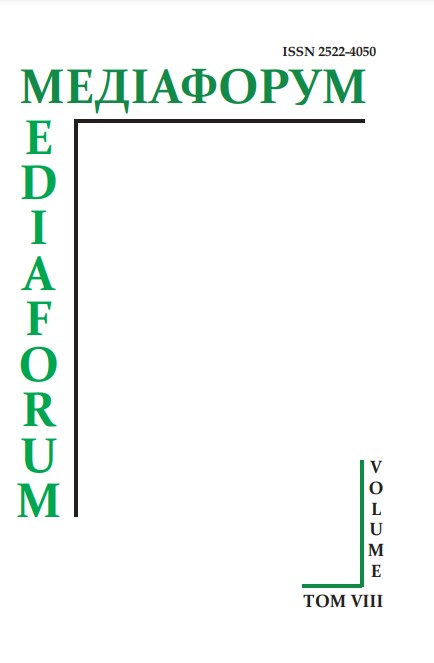Critique of Reflective Modern Theory in Contemporary Political Science
DOI:
https://doi.org/10.31861/mediaforum.2020.8.132-147Keywords:
political science, political theory, theory of reflexive modernism, criticism, multiple modernityAbstract
The article studies the main lines of criticism of the theory of reflexive modernism. It is proved that in modern political science it unfolds around certain provisions of the theory of reflexive modernism. It is substantiated that Eurocentrism of the definition and interpretation of reflexive Art Nouveau, characteristic of the studies of U. Beck, A. Giddens, and J. Habermas, is criticized. A critical attitude towards eurocentrism of reflexive modernism provoked the formation of the idea of the probability and reality of the multiplicity of modernities (for example, Asian concepts of compressed modernity and enhanced modernization). It is proved that the most important vectors of criticism of the theory of reflexive modernism are: (1) the role and functions of political time and chronopolitics in different cultures and political systems; (2) the functional characteristics of political actors, primarily the state and citizen; (3) the scientific position according to which political and politics in the framework of the realities of reflexive modernism cannot remain in a stable form, therefore it is inevitable to identify new institutional characteristics of modernity that significantly expand the concept of radical modernism; (4) the need to clarify such a characteristic feature of reflective modernity as changing the system of control over the means of violence; (5) the search for the limits of application of the theory of reflexive modernism in the study of political processes in the modern world.
Downloads
References
Allard, E. 2002. “Somnitel`ny`e dostoinstva konczepczii modernizaczii”. http://2001.isras.ru/SocIs/SocIsArticles/2002_09/Allard.doc (accessed 10 June19).
Filippov, A. F. 2001. “Pechal`naya globalizacziya: lokal`noe bez granicz, global`noe bez mesta”. V: Bek U. Chto takoe globalizacziya? Moskva: Progress-Tradicziya. S. 283–297.
Beck, U. 2009. “Critical Theory of World Risk Society: A Cosmopolitan Vision” https://www.e-skop.com/images/UserFiles/Documents/Editor/urlich-beck-cosmopolitan-view.pdf
Beck, Ulrich. 2000. “Risk Society Revised: Theory, Politics and Research Programmes”. In: The Risk Society and Beyond. London: Sage Publications: 211–229.
Beck, Ulrich and Grande, Edgar. 2010. “Varieties of second modernity: The cosmopolitan turn in social and political theory and research”. British Journal of Sociology 61(3): 409–442.
Chang, Kyung-Sup. 2010. South Korea under Compressed Modernity: Familial Political Economy of Transition. London: Routledge.
Medrano, J. D. (2003). Questioning Modernity: A Test of Giddens’s Beck’s and Inglehart’s Theories. CCSA-Past Papers. http://www.sscnet.ucla.edu/soc/groups/ccsa/medrano.pdf (accessed 14 April 19).
Fischer, F. 1998. “Ulrich Beck and the Politics of the Risk Society”.Organization and Environment. 11 (1): 111–115. http://proquest.umi.com/pqdweb?RQT=305&SQ=AUTHOR(Frank%20Fischer)&SMR=1&SAid=0&SAName=sa_menu&JSEnabled=1&TS=1028547696 (accessed 10 April 19).
Han, Sang-Jin. 2015. “Second-modern transformation in East Asia: An active dialogue with Ulrich Beck” Socio. 5: 45–64 http://journals.openedition.org/socio/1897 (accessed 10 April 19).
Han, Sang-Jin. 2012. Divided Nations and Transitional Justice: What Germany, Japan and South Korea can Teach the World. Boulder: Paradigm Publisher.
Han, Sang-Jin and Shim, Young-Hee. 2010. “Redefining second modernity for East Asia: A critical qssessment,” British Journal of Sociology. 61(3): 465–488.
Han, Sang-Jin. 1997. “The political economy and moral institutions: The formation of the middling grassroots in Korea”. Humboldt Journal of Social Relations. 23(1–2): 71–89.
Han, Sang-Jin. 1998. “The Korean path to modernization and risk society,” Korea Journal. 38(1): 5–27.
Han, Sang-Jin. 2013. “Tackling the global threat through the ‘tianxia gonsheng”. Hankyoreh (newspaper). December 2. http://english.hani.co.kr/ (accessed 10 June19).
Knodt, E. M. 1991.“Irony and the Discourse of Modernity”. Philosophy and Literature. 15(2): 356–357.
Lash, S. 1994. “Reflexivity and its Doubles: Structure, Aesthetics, Community”. In: Beck U., Giddens A., Lash S. Reflexive Modernization: Politics, Tradition and Aesthetic in the Modern Social Order. Cambridge: Polity Press. P. 56–109.
Lash, S. 2000. “Risk Culture” In: The Risk Society and Beyond. London: Sage Publications. P. 47–62.
Leccardi, C. 2008. “New biographies in the ‘risk society’? About future and planning”. Twenty-First Century Society. 3(2):119–129.
Leccardi, C. 2014. “Time of Society and Time of Experience: Multiple Times and Social Change” KronoScope 14(1):10-24.
Leiss, W. 1992. Review on Beck U. Risk Society: Towards the New Modernity. London: Sage. http://www.ualberta.ca/~cjscopy/articles/leiss.html (accessed 10 June19).
Levitas, R. 2000. “Discourses of Risk and Utopia”. In: The Risk Society and Beyond. London: Sage Publications. P. 198–210.
Lyons, K. 2006. “Golbalization and Social Work: International and Local Implications” British Journal of Social Work. 36(3):365–380.
McDonald, P. 2001. “Low fertility not politically sustainable”. Population Today. 29(6):3–8.
More, M. 2013. “The Philosophy of Transhumanism”. In: More, M., Vita-More, N. (eds.), The Transhumanist Reader: Classical and Contemporary Essays on the Science, Technology, and Philosophy of the Human Future. New York: John Wiley & Sons, Inc. P. 3–17.
Murphy, R. 1994. Rationality and Nature. A Sociological Inquiry into a Changing Relationship. Colorado: Westview Press.
Murphy, R. 1997. Sociology and Nature. Colorado: Westview Press.
Offe, C. 2009. “Governance: An ’empty signifier’?” Constellations. 16(4): 550–562.
Randeria, Sh. 2017. “Mobilizing law for solidarity” https://www.eurozine.com/mobilizing-law-for-solidarity-an-interview-with-shaliniranderia/?pdf (accessed 10 June19).
Rose, H. 2000. “Risk, Trust and Scepticism in the Age of the New Genetics”. In: The Risk Society and Beyond. Ljndon: Sage Publications.
Rusanen, T. 2002. “Challenging the Risk Society. The Case of Finland”. Science Communication. 24(2):198–208.
Rustin, M. 1994. “Incomplete Modernity: Ulrich Beck’s “Risk Society” [Recensio]”. Radical Philosophy. 67: 3–12.
Scott, A. 2000. “Risk Society or Angst Society? Two Views of Risk, Consciousness and Community”. In: The Risk Society and Beyond. London: Sage Publications. P. 33–46.
Susen, S. 2009. “Between Emancipation and Domination: Habermasian Reflections on the Empowerment and Disempowerment of the Human Subject”. The Warwick Journal of Philosophy 20: 80–110.
Tully, J. 1989. “Wittgenstein and Political Philosophy: Understanding Practices of Critical Reflection”. Political Theory 17(2):172–204.















